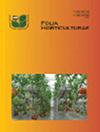热适应对试管草莓幼苗耐热性的影响
IF 2.2
4区 农林科学
Q2 HORTICULTURE
引用次数: 0
摘要
随着气候变化导致全球气温升高,草莓产量正面临严重下降。要使草莓植株在高温条件下保持高产,提高其耐热性势在必行。本研究旨在研究热适应对遭受严重热胁迫的草莓植株耐热性的影响。对组织培养的草莓'桃源1号'小苗进行了四次热适应处理,温度从30°C逐渐升高到42°C,持续时间为1.25小时到10小时,然后将其置于48°C的致死温度下4小时。结果表明,草莓小苗在致死温度条件下存活需要热适应。与非适应性小植株相比,适应性小植株的电解质渗漏和叶绿素降解程度较低,脯氨酸含量较高。除了抗坏血酸过氧化物酶(APX)的活性在 39°C 达到峰值外,其他抗氧化酶的活性随着适应温度的升高而增加,并在 42°C 达到峰值。与非适应性小植株相比,适应性小植株的超氧化物歧化酶(SOD)、抗坏血酸过氧化物酶(APX)、谷胱甘肽还原酶(GR)、过氧化氢酶(CAT)和过氧化物酶(POD)的活性更高。这项研究表明,在严重的热胁迫下,通过减少电解质渗漏和叶绿素降解,以及提高脯氨酸含量和抗氧化酶活性,热适应可改善离体草莓小苗的耐热性。本文章由计算机程序翻译,如有差异,请以英文原文为准。
Effect of heat acclimation on thermotolerance of in vitro strawberry plantlets
Strawberry production is facing a serious decline with the increase in global temperature as a result of climate change. Improving the heat tolerance is imperative for the strawberry plants to remain productive under high temperature conditions. The present work aimed to study the effect of heat acclimation on the thermotolerance of strawberry plants subjected to severe heat stress. Tissue cultured Fragaria ‘Taoyuan No. 1’ plantlets were subjected to four heat-acclimation treatments with gradual increase of temperatures from 30°C to 42°C for 1.25 hr to 10 hr before exposing them to the lethal temperature of 48°C for 4 hr. Survival, new leaf emergence and root growth, electrolyte leakage, chlorophyll and proline contents, as well as antioxidant enzyme activities were compared between the control, acclimated and non-acclimated plantlets. Results indicated that heat acclimation was required for the strawberry plantlets to survive under lethal temperature conditions. The acclimated plantlets registered a lower degree of electrolyte leakage and chlorophyll degradation, and a higher proline content compared to the non-acclimated plantlets. The activities of the antioxidant enzymes increased with the elevation of acclimation temperature and peaked at 42°C except for ascorbate peroxidase (APX) whose activity peaked at 39°C. Higher activities of superoxide dismutase (SOD), APX, glutathione reductase (GR), catalase (CAT) and peroxidase (POD) were observed in the acclimated plantlets compared to the non-acclimated plantlets. This study demonstrates that heat acclimation improved the thermotolerance of in vitro strawberry plantlets by reducing electrolyte leakage and chlorophyll degradation, as well as by enhancing proline content and antioxidant enzyme activities under severe heat stress.
求助全文
通过发布文献求助,成功后即可免费获取论文全文。
去求助
来源期刊

Folia Horticulturae
Agricultural and Biological Sciences-Horticulture
CiteScore
3.40
自引率
0.00%
发文量
13
审稿时长
16 weeks
期刊介绍:
Folia Horticulturae is an international, scientific journal published in English. It covers a broad research spectrum of aspects related to horticultural science that are of interest to a wide scientific community and have an impact on progress in both basic and applied research carried out with the use of horticultural crops and their products. The journal’s aim is to disseminate recent findings and serve as a forum for presenting views as well as for discussing important problems and prospects of modern horticulture, particularly in relation to sustainable production of high yield and quality of horticultural products, including their impact on human health.
 求助内容:
求助内容: 应助结果提醒方式:
应助结果提醒方式:


